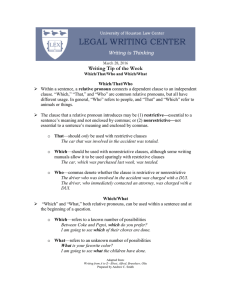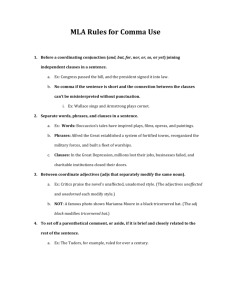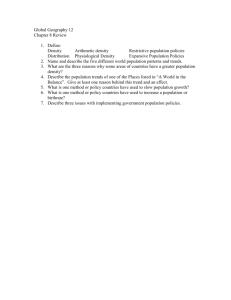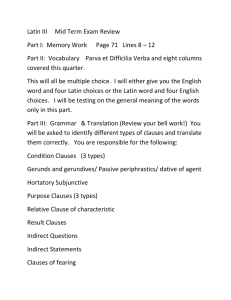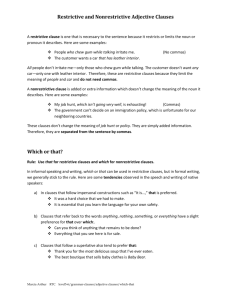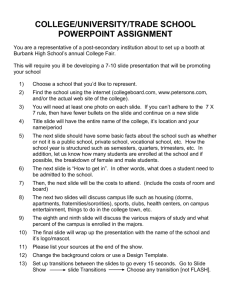provide evidence of suitable preparation for study at the college... has never established any limitations on admission based on race,...
advertisement
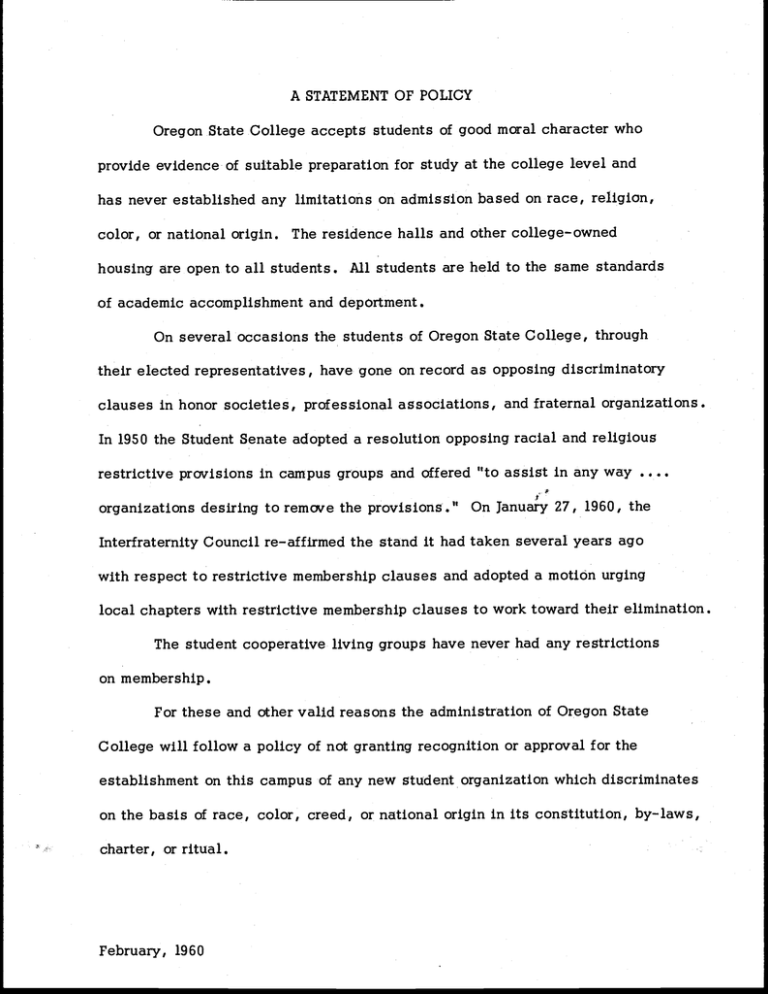
A STATEMENT OF POLICY Oregon State College accepts students of good moral character who provide evidence of suitable preparation for study at the college level and has never established any limitations on admission based on race, religion, color, or national origin. The residence halls and other college-owned housing' are open to all students. All students are held to the same standards of academic accomplishment and deportment. On several occasions the students of Oregon State College, through their elected representatives, have gone on record as opposing discriminatory clauses in honor societies, professional associations, and fraternal organizations. In 1950 the Student Senate adopted a resolution opposing racial and religious restrictive provisions in campus groups and offered "to assist in any way organizations desiring to remove the provisions.1' On Januaxy 27, 1960, the Interfraternity Council re-affirmed the stand it had taken several years ago with respect to restrictive membership clauses and adopted a motiOn urging local chapters with restrictive membership clauses to work toward their elimination. The student cooperative living groups have never had any restrictions on membership. For these and other valid reasons the administration of Oregon State College will follow a policy of not granting recognition or approval for the establishment on this campus of any new student, organization which discriminates on the basis of race, color, creed, or national origin in its constitution, by-laws, charter, or ritual. February, 1960 OREGON STATE COLLEGE CORVALLIS. OREGON OFFICE OF THE DEAN OF MEN February 4, 1960 COMMERCE HALL TO: R; President A. L. Strand Report on Membership Clauses for Student Living Organizations Students at the College have been working on removal of restrictive membership clauses both in living organizations and student honor societies since the end of World War II. The first such example was in connection with the "white Caucasian" clause of Blue Key. In 1947 our delegate to the National Convention of Blue Key, along with other student representatives, had a part ir the removal of such restrictive membership requirements with the result that today Blue Key is open to young men of any race, color, or creed. Also, that the Interfraternity Council in the immediate post World War II days went on record In opposition to restrictive clauses for fraternity membership and, requirements to work for their removal through the national conventions of their fraternities. During the years 1947-50, the Student Senate did a great deal of work with respect to urging the removal of restrictive membership aluses from all student organizations. A Committee on Human Relations was established which inquired into practices on campus which were of a discriminatory nature0 Its findings were made available to the Student Senate and to the Student Life Committee. At Its meeting February 24, 1949, the Student Life Committee adopted the following resolution: "In order that a continuing program fostering inter-racial understandings be promoted on the Oregon State College campus, the Student Life Committee recommends that the Senate (Student Senate) go on record as urging all groups on this campus havIng restrictive clauses to take whatever action is available to remove these clauses from their national constitutions, feeling that a voluntary Step by these groups would be far more effective in demonstrating a determined effort towards equality than by a legislative act directed only at future organizat1ons. On May 2, 1950, a proposal of the Human Relations Committee of the Student Senate was made to the Student Life Committee. The proposition follows: "Be it enacted by the Senate of the ASOSC that the Student Life Committee be directed to deny recognition to any organization attempting to form on the campus of Oregon State College if the organization has racial or religious restrictive membership provisions in its constitution, charter or by-laws. FUrther, be it known that the Associated Students of Oregon State College favor President A.L . Strand, Page *2 - Report on Membership Clauses the removal of those restrictive provisions now In effect In groups on the campus and offer to assist, in any way they can, organizations desiring to remove the provisions." On May 16, 1950, after studying carefully the above proposition, the Student Life Committee adopted the following recommendation which was referred to the ASOSC Senate on May 23, 1950: "Be it known that the Associated Students of 050 are opposed to those racial and religious restrictive provisions now in effect in groups on the campus and offer to assist in any way they can organizations desiring to remove the provisions." The Senate adopted this majority report of the Student Life Committee by an overwhelming vote. A survey of all student living organizations was conducted in 1953 to determine what restrictive membership clauses, if any, were in effect. For the 30 fraternities the following results were found: 17 had no restrictive membership in any form while 13 did. A most recent survey among fraternities conducted the past month shows that of the 31 fraternities, 26 have no restrictive clauses whatsoever and only 5 do. This is a tremendous improvement within a seven year span. For the sororities in 1953, the results of polling thp 16 groups showed that 2 had re?trictive membership clauses and,14 did hot. In 1960 with 17 sororities, \ indicated restrictive clauses, f did not. The student dormitories and student co-ops have always been open to the students of all races, creeds and color. The situation in town also has shown great improvement with respect to housing of students of all faiths and colors. According to our Housing and Employment Office there is little difficulty in placing students Of course, some people in town prefer students with certain backgrounds. We have had little, if an, f culty in placing foreign students, including black skinned people from -. Whatever reluctance there might be on the part of a few householders stems not because of prejudice towards the individual being housed, but rather because of the feelings and preference of other students who are being housed by the same householder. It should be stated that a landlady does not have the same opportunity to select those who live with her as do the organized living groups, and I would Say that on the whole the attitude of those who house students in town towards students of all colors and faiths is excellent. The Interfraternity Council in its January 27 meeting of this year re-affirmed the stand it had taken several years ago with respect to restrictive membership clauses. It adopted a motion urging those local chapters with restrictive membership clauses to work towards their elimination through the national conventions that will be coming up for most of the fraternities during this summers President A. L. Strand page *3 - Report on Membership Clauses Many of our fraternities have had representatives' of minority groups as full-fledged members for many years. At the present time one will find descendants of Japanese, Chinese, Hawailans, Indians' as well as those of faiths other than Christian as members of our student groups. Whenever we visit with representatives of national fraternities we always make It a point to bring up the question of restrictive membership. It has been encouraging to me to learn of the efforts that have been made throughout the country on the part of forward-thinking fraternity executives, especially among the younger group, towards' the removal of restrictive clauses. Some of the fraternities which had their origin in the deep South may very well hold to their clauses which might cause a division into northern and southern groups Of such ftaternitie s. Da P0 ng Dean of Men I/ FRATERNITIES AT OREGON STATE COLLEGE The value of the property owned and operated by 31 fraternitieS, sororities (out of a total of 17) and three cooperatives at OSC is $4,051,790. These properties house approximately 2250 students. If the state were to furnish standard housing for them, the total cost, not including land, would be well over $6,000,000. / (, The assessed value on the above housing is $1,012,960. The taxes amount to about $79,000. Aside from the consideration of such living groups from the standpoint of furnishing housing for college students, they are important to the community as well. Although they pay school taxes just like other property taxpayers, they constitute rib burden on-the schools for they house no children of school age. The relation of these organizations to the college is quite specific. They operate under "charter" from the institution. No living-group organization, fraternity or cooperative, could be established here except with the permission of the college. There has been for a long time an excellent relationship between the officers Of national fraternities and sororities and the colige. For instance, a chapter on this campus that lost its institutional approval ould immediately lose its national charter. However, at the same time, the organizations are private. Practically all are corporations. The college takes no financial responsibility for them whatever, although we require monthly audits in exchange for which we help them collect on some of their accounts. They are social organizations whose right to choose their own members has been traditionally recognized. With these financial and other relations in mind, for the college to fix a deadline when all restrictive membership clauses must be removed, would be resorting to a stern measure that might necessitiate court action. To our knowledge no opinion of the Oregon Attorney General has been given, but a favorable opinion cbtains in California and backs the institutional authority to enforce membership regulations. However that may be, such procedure would seriously affect the college's relations, not only with some of the active chapters, but also with many of our alumni. Some staunch friends of the Institution would be alienated. We would like to avoid any extreme measure. We would have little to gain and very much to lose. The progress that has been made during the last ten years indicates that all of our living groups will have removed restrictive clauses before very long. The active members of the organizations are putting pressure on their national officers and speaking for the removal of membership Fraternities at Oregon State College page %2 restrictions at national conventions. The national officers of fraternities and sororities, which still retain restrictions on race and religion, know the attitude of the institutions and of OSC in particular. Some spokesmen for liberal organizations want Immediate action. They could claim then that they had brought about progress in racial relations, etc. But such a victory might be a Pyrric one. The important changes in human relations are not represented by changes inthe wording of documents. Such are merely ostensible changes and Invite hypocrisy and evasion. The teal change today Is in the attitude of college students toward discrimination. For this the Institutions can be grateful and proud. A. L. Strand, President February 16, 1960
